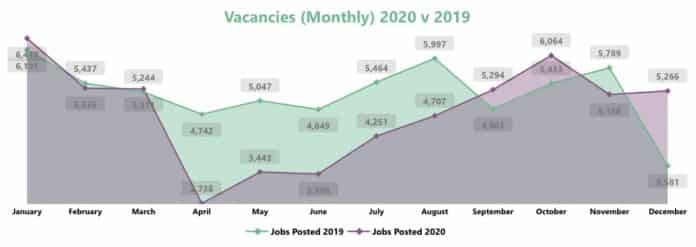Dorset Local Enterprise Partnership (LEP) has reviewed labour market information throughout 2020 to assess what the dynamics of a rapidly developing pandemic and EU transition uncertainty has meant for the world of recruitment, employment and skills in Dorset.
Their recently published ‘look back’ report highlights that while unemployment did increase in 2020, it remained lower in Dorset over the first half of the year and unlike previous recessions, due to many jobs and businesses protected by national and regional support schemes, employment vacancies returned relatively quickly, allowing for some cautious optimism.
The number of furloughed workers significantly dropped in November without causing further increase in universal credit claimants, indicating movements back to work. Another mitigating factor is homeworking, which saw a steep rise in April when almost half of employees were working from home – with very few returning to the office since.
As previously reported by Dorset LEP, the impact of the pandemic on the hospitality, tourism and arts sectors has been significant, with labour demand falling by half in these areas.
However, latest figures indicate that a cluster of Dorset’s key sectors are starting to pave a road to recovery. Recruitment activity during 2020 in the financial services, utilities, professional services, scientific and technical activities was largely maintained through jobs such as accountants, lawyers, web developers and cleaners, while the health and social care sector grew by a quarter.
Compared to the UK average, overall, Dorset’s job market has proven to be more agile and resilient than many other areas of the UK. Dorset’s job market typically bounced back better and faster following each national lockdown, with over 57,000 vacancies advertised in Dorset during 2020, closing the year at 92% of 2019 levels.
Dorset LEP also found that the number of claimants for each advertised vacancy was decreasing by the end of 2020. There were 4.6 claimants for each advertised vacancy in November, a ratio three times as high as the pre-crisis levels but showing improvement from a 7.5 peak in May. As large parts of the economy closed in March, a quarter of working age residents were furloughed, and claimant count grew almost threefold in Dorset.
Looking at employment by nationality in the UK, in September 2020 compared to a year earlier, there were 5% more British workers in employment, however, a significant proportion of European workers (16.5%) have disappeared from employment. Notably, there were almost a quarter fewer employed from A8 and A2 EU countries, which include largely eastern European countries.
As the pandemic hit sectors of the economy differently, low-skilled workers and young people were disproportionately affected due to almost half of the region’s 18-24-year-olds employed in distribution, hotels and restaurants.
What this review clearly highlights is a mismatch between job vacancies in Dorset’s key sectors and the skills and experiences of a large proportion of Dorset’s available workforce. This mismatch creates risk for prolonged unemployment for job seekers while skills gaps remain a challenge for employers, despite the increase in number of applicants.
Rebecca Davies, Head of Enterprise, Skills & Industry at Dorset LEP, said: “Historically, Dorset has adjusted relatively quickly to shocks, maintaining low unemployment. Economic recovery will depend on solving a skills mismatch between those looking for jobs and the sectors with vacancies, meaning it is critical that people gain new skills to avoid long-term unemployment.
“To rise to this challenge Dorset LEP is investing in several initiatives both through an enhanced business support package from our growth hub, Dorset Gateway, as well as through our delivery of Dorset Careers Hub, which supports over 70 of Dorset’s schools. We’re helping these schools understand these labour market insights so they can direct their students to local employment, while also turning to medium and large businesses across the region able to help develop the skills they need by providing young people with short-term virtual work experience opportunities, join our Enterprise Advisor Network and take part in a careers fair later this spring.”
Dorset LEP is also endorsing regional and national initiatives such as the free Train4Tomorrow Skills Bootcamps, national careers fairs and the ‘hour to skill’ campaign encouraging all people to set aside an hour per week for online learning to develop a new skill.
Find the latest labour market insights and the ‘Look back at 2020’ report on the Dorset LEP website where you will also find information about opportunities and skills needs of the local economy and key industries: www.dorsetlep.co.uk/dorset-labour-market-insights-december-2020
PLEASE SUPPORT US FOR JUST £2 A MONTH







